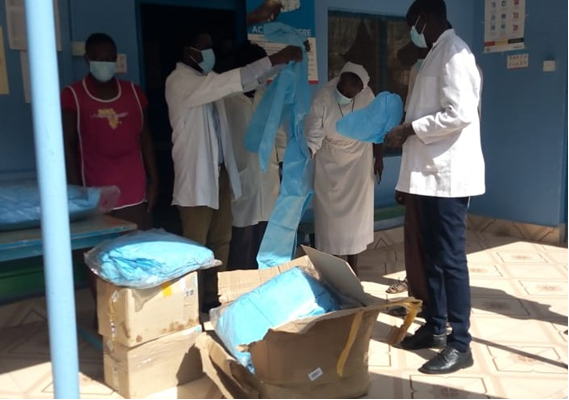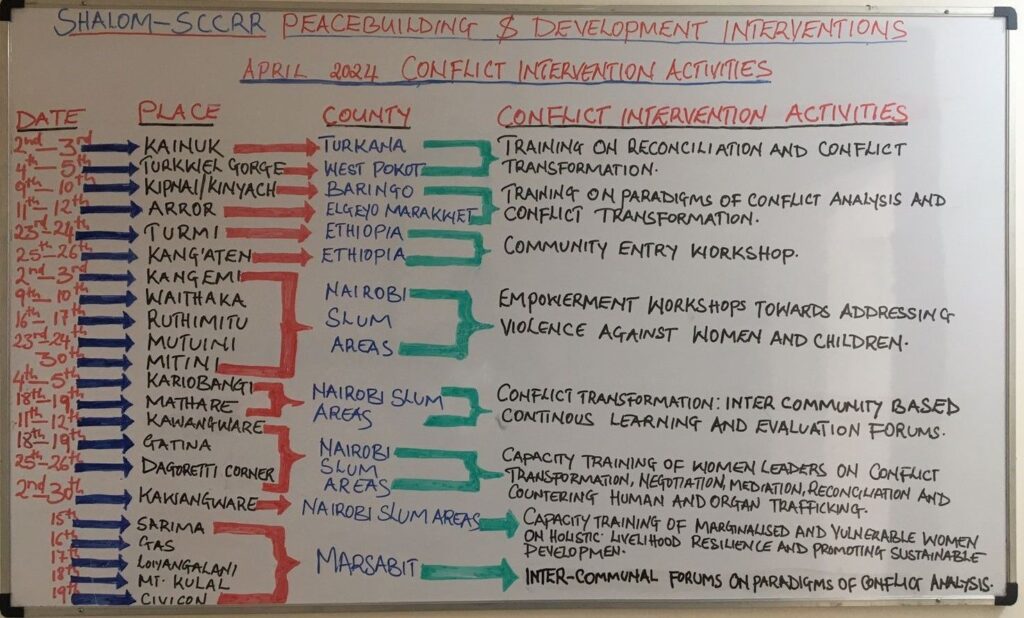During this unprecedented difficult period of the Covid-19 pandemic that has rocked the world, Shalom-SCCRR continues to contribute in the prevention of the spread of the virus through its different communication platforms (website, emails, Facebook, Twitter, LinkedIn and text messaging). The organisation currently utilizes the following strategies:
- Shares detailed factual information from the World Health Organisation about coronavirus with the vulnerable and marginalized conflict traumatized communities where we work;
- Empower all our our supporters, families, friends and colleagues across the world to be proactive in getting the Covid-19 prevention-containment guidelines circulated in word and through their responsible behaviour;
- Continually sensitizing local communities and local-based institutions on the directives/measures given by various governments to curb the spread and manage the COVID-19 across Eastern Africa;
- Shares encouraging messages of solidarity, prayers and support to all the vulnerable communities, associated educational institutions, families, friends and colleagues during this challenging times;
- In collaboration with the local leadership (chiefs, religious leaders, women & youth leaders), county governments and local-based organisations in conflict zones, Shalom-SCCRR is currently creating opportunities for women and youth in participating in the sewing and distribution of face masks and other protective gears across Kenya;
- Continuous monitoring of the impact of COVID-19 on conflict transformation processes, and the impact of conflict transformation on the prevention and containment of the virus in project areas across Eastern Africa through our Lead Community Facilitators (LCFs), influential opinion shapers, local administrators (chiefs), elders, group leaders and religious leaders (priests, Imams, nuns & pastors);
- Frequent and regular communication with the members of our community groups on conflict and peace situations in project areas across Eastern Africa.
- Languages being used: We are using mainly English, Kiswahili and some local languages to continue engaging with our communities in project areas. Through our social media platforms and emails, we use English whereas Kiswahili and local languages are used in sharing information and engaging with the members of our community groups in the conflict zones, through text messages and phone call conversations. However, it is, therefore, important to note that most of the members of our community groups neither have email addresses nor smart phones for receiving emails from SCCRR. This is why text messages and phone call conversations are the preferred modes of communicating to most of the members of our community groups.
- What is being done in the local languages: Where possible, we send out emails and text messages to members of Shalom’s community peace groups using local languages. However, in most cases we use Kiswahili to relay the information through text messages and phone call conversations. Furthermore, Shalom’s Lead Community Facilitators (LCFs), groups’ leaders (including women leaders), religious leaders, local administrators (chiefs) and school teachers (Peace Clubs’ Patrons) still reach out to the members of their communities using their indigenous languages also through text messages, phone call conversations and social media platforms. Women leaders and teachers (Peace Clubs’ Patrons) in particular reach out to the members of their women groups and members of schools’ peace clubs respectively.
- Evidence of feedback from the conflict zones: We continually engage with the members of our community groups and receive feedback (reports) on what is being done by the communities in regards to COVID-19 pandemic and peacebuilding from the conflict zones across Eastern Africa through our Lead Community Facilitators (LCFs), group leaders, religious leaders (priests, nuns, pastors & Imams), elders and local administrators (chiefs).
- Issuance of anything on the relationship of Covid-19 to conflict transformation processes: Shalom-SCCRR continues to monitor the impact/effects of Covid-19 pandemic on conflict transformation processes in our project areas and will be issuing something (through an article) soon in regards to the same and will be sharing with our contacts, supporters/donors and communities.
- Shalom-SCCRR will continue collaborating with local communities, local-based institutions/organisations and governments in Eastern Africa in the fight against the COVID-19 pandemic. As Shalom-SCCRR community, we believe that together we shall overcome this menace across all continents.
- We thank our esteemed supporters and donors from the USA, UK, Ireland, Australia and other parts of the world for their unwavering support of our peacebuilding and conflict transformation work in Eastern Africa. Overcoming the Coronavirus will be a tremendous help in the conflict and poverty ridden areas where work. We believe that overcoming this adversary will generate a greater sense of interdependence and the need to coexist in the spirit of compassion, peace, truth, justice and mercy. We are FOREVER indebted to you our beloved supporters and donors.
Authors:
Fr. Oliver Noonan, MA: Executive Director
Esther Njeri Kibe, MA; Program Officer/Team Leader (Turkana – West Pokot & Marsabit Projects), and Head of Communications Department.
Asha Awed Said, MA Candidate; Program Assistant (Turkana – West Pokot, Marsabit & Nairobi Projects).
Austin Ngacha Macharia, MA; Program Officer/Team Leader (Ilemi Triangle Project).
Paulson Erot Tadeo, MA; Program Manager (Peacebuilding & Development), Northern Kenya Program.
Rev. Dr. Patrick Devine: International Chairman


